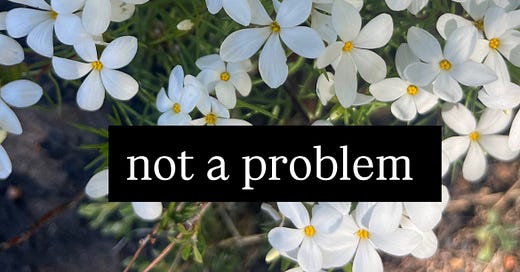Quit The Should-ing
The trap of trying to be the “kind of person” who is different than you are
Have you ever caught yourself wishing that you were “the kind of person” who is, in short, different than the person you are?
Or, ever found yourself telling other people that you are “the kind of person who…” doesn’t like this, or needs that, or feels a certain way about it all?
Of course, considering ourselves as the “kind of person who…” lives by their moral values, or is compassionate or generous, or engages in healthy habits, is a nice kind of thing. Remembering that we’re the “kind of person who…” picks up litter or offers to drive friends to the airport helps us keep our rivers clean and travel Uber bills down.
And, so often, I hear this phrase uttered in a sort of wishful thinking fashion, an expressed longing to be a different kind of person: ‘I wish I was the kind of person who…,’ or ‘I should be the kind of person who…’. The person they think they should be might be one who runs marathons, or always buys organic, or wakes up earlier to workout, or has any other distinctly ‘better’ quality or habit they unfortunately lack.
Other times, I hear this phrase uttered as a kind of ego-brag: you know, the kinds of people who tell you all about the interesting, unique kind of person they are. Whenever I hear wellness influencers tell their followers about being the kind of person who just always has to get their red-light therapy before bed and their superfood tonic in the morning otherwise they just can’t function, I can’t help but roll my eyes.
However, let’s focus here on the former category: the should-ers. We all do it; we all are the kinds of people who should on ourselves for doing or not doing the things we think we should or shouldn’t do. The main problem with should-ing is that it introduces shame—and shame, as we know, does not typically eventuate in growth.
My friend Austin said to me years ago that if we think we should become the kind of person who “Does X” (e.g., meditates, reads nonfiction, is organized) or “Doesn’t do Y” (e.g., stay up too late, take things personally), then by default that means we are actually not that person. The fact that we have identified what we ought to be implies its separation from who we are now; what we should be, that is, is a mental illusion. Being who we actually are now, is, paradoxically, the key to becoming ever-slightly different versions of ourselves: As the late psychotherapist Carl Rogers said, “As soon as we accept ourselves exactly as we are, then we can change.”
Accepting who we are—the kind of person we simply happen to be—as well as being who we are, is much more likely to beget the positive changes we hope to see.
On the contrary, what doesn’t allow us to grow is being a should-er: trying to be what you presently are not by way of shaming yourself into it. What also doesn’t allow for change is identifying as “the kind of person who…”. When we attach our identities to our current habits, activities, and preferences—whether positive or negative—we create a mental representation of who we are that, by nature, limits who we can be.
What if we quit limiting who we are—that is, quit defining and qualifying and identifying ourselves to other people?
What if we go about discovering the person we are instead of laboring over the kind of person we think we should be, wish we could be?
By Rogers’ rule of thumb, accepting ourselves as we are now is what actually allows us to change. This includes all of the parts of us that we wish weren’t true: the character flaws, the bad habits, the acne. Who we are right now is indeed who we are right now—and while we may certainly grow and evolve, we can only ever deal with right now.
Let us try out being the kind of people who stop declaring ourselves a certain “kind of person”. Instead of hitting ourselves with ‘I should be…’ or ‘I wish I was…’, let us practice being the person we simply are, now. Let us see where that takes us.
The next time you catch yourself uttering the words, “I’m the kind of person who…”, consider this:
Are you really?
Maggie



